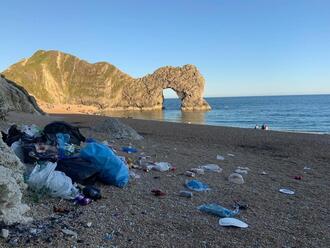-
Clean up our RiversRaw sewage flowing into the rivers and into our seas means that large areas of the United Kingdom are unsuitable for swimming and watersports as well as having a huge effect on the wildlife on the rivers and seas which has a knock on effect to the overall health of our ecosystem. Where we live in Scotland we regularly see sanitary towels amongst other waste all over the beach on rainy days straight from CSO's and into the river.145 of 200 SignaturesCreated by Joe Carter
-
Deptford Town Hall Statues Must Fall!The four statues: Drake, Blake, Nelson and even a nameless white man as a ‘representation’ of Imperialist. Racist. Power. All have strong roots in the slave trade. Down with honouring white supremacy and people who subjugated nations and enslaved people! Deptford Town Hall opened in 1905 as the town centre, but since it was taken over by Goldsmiths in the late 1990s, it’s no longer open to the local community. Not only are community members denied access to the building, but we must also endure glorified emblems of slavery on the front of the building. The four statues are of: Sir Francis Drake (c. 1540 – 1596), a pioneer of the slave trade making at least three royally sponsored trips to West Africa to kidnap Africans and sell them. Elizabeth I awarded Drake a knighthood in 1581. Robert Blake (1598 – 1657), an admiral who served under Oliver Cromwell throughout the English Civil War. He fought the Dutch to secure the (slave) trade triangle between the Caribbean, West Africa and England. Cromwell was responsible for trafficking the first waves of enslaved people to and from the Caribbean; installing the plantation system in Jamaica; and the massacres in Drogheda (1649). Horatio Nelson (1758 – 1805), was a naval flag officer whose leadership was during the Napoleonic Wars (1803 – 1815). Nelson spent a large part of his career in the Caribbean and developed an affinity with the slave owners there, using his influence against the abolitionist movement in Britain. The fourth statue, understood to be a ‘representative’ figure, rather than a specific person, from the period when the building was constructed. It shows a modern admiral, with sextant and binoculars. Deptford was strongly connected with the transatlantic slave trade, with many ships built, fitted and repaired in the local docks before heading out to Africa. Olaudah Equiano was initially trafficked to Deptford; he fought to become a freedman and was one of the key figures in the abolitionist movement. Here is a man we want to remember. Original text and text that is on the placards here: https://www.gold.ac.uk/about/history/dth-statues/757 of 800 SignaturesCreated by Deptford Town Hall Statues Must Fall

-
Merchant City ParkGlasgow City Centre is seriously lacking in green spaces. A City Park, built a mere 5 minutes’ walk from George Square, surrounded by lovely local cafés and restaurants, will be an invaluable boost to our wonderful city. Merchant City & Trongate Community Council (MCTCC), following the withdrawal of a Planning Application for an hotel at the Ingram Street Car Park, agreed that a City Park would be the best use of this site. A City Park on this site would protect the beautiful world-renowned Fruitmarket Mural by Smug, which has become a much-visited sight of the city, and the existing stunning mature cherry and chestnut trees. With both a world-renowned piece of art and existing mature trees, this site could be an oasis of peace and beauty in a historic part of Glasgow. The City Park would be entirely inclusive, open for residents, visitors, tourists and the wider general public. People could simply relax in nature, rest, read, meet up, mix, chat, walk the dog or play games. All right in the City Centre of Glasgow.2,398 of 3,000 SignaturesCreated by Merchant City Park
-
Don't bring back benefit sanctions!Imagine arriving to work five minutes late and having your pay docked. For anyone who depends on benefits, it only takes missing the bus to the JobCentre to be given a sanction and lose payments. With the UK economy going to be hit hard with job loses in the thousands, we cannot let benefit claimants have their money stopped or cut. During the height of the coronavirus crisis, there were no sanctions. The government stopped them for 3 months. We know that the benefits system can function without sanctioning people. But benefit sanctions are set to return in England. Huge public backlash could force the government to rethink their decision, and stop the unfair and cruel sanctions for good.77,606 of 100,000 SignaturesCreated by Hugh Mccourt
-
Make the Stapeley Garden footpath crossing safeThe footpath has been reopened with no traffic controls - it leads onto a busy A road from a concealed entrance onto a bend in the road - many children will use this footpath to get to the local primary and secondary schools and without better warnings and traffic controls this could be a very dangerous crossing, basically it could be a tragedy accident waiting to happen212 of 300 SignaturesCreated by Anna Burns
-
Dorset Police to take a crime report/ animal abuseFailure to report a crime prevents an investigation into the crime and does not prevent a further wildlife crime from being committed again.333 of 400 SignaturesCreated by Kate Bradley
-
Save lives - support campaign for cycle/pedestrian route along Redbourn roadThe Government is encouraging more of us to find safer ways to travel in the light of the impact of Covid 19. Cycling, walking, running all enable us to avoid public transport. This petition, launched by the Active in Redbourn community group, calls on Hertfordshire County Council to create a long-awaited safe cycling, walking and running route between Redbourn and St Albans This major highway route for travel between St Albans to Redbourn (formerly the A5) has become downgraded from a “trunk” road over the years but traffic flow has increased. It has become an extremely hazardous, often dangerous road over the last few years and has led to several cycling fatalities. Despite this it is still used by hundreds of cyclists a week be it as individuals or riding as a club or part of a group. A “ footpath” is in existence but poorly maintained and not inviting for cyclists, walkers or runners to utilise this route (though it is currently only a pedestrian path in its current form). A safe shared space for cycling, walking and running would connect the much used Nickey Line which currently links Hemel Hempstead to Harpenden, along with many existing routes through St Albans, then onwards other parts of the county Many families and residents of Redbourn and the surrounding areas would love to have the option of a safe, environmentally friendly and easily accessible route to St Albans for work or leisure. Equally St Albans residents would benefit from a safely made trip to Redbourn to enjoy the village common, pubs and destinations like the Redbournbury Mill, thereby sustaining the Redbourn's facilities and improving their health. The cost of one fatality is nearing the £2 million mark, the probable cost of providing a safe, maintained pathway would become cost effective and “ pay for itself” in a couple of years. It is possible to ride to St Albans via Harpenden but is around twice the distance and consists of a much more challenging route, prohibiting large groups of people wishing to travel sustainably. A route following the old A5 (Watling Street) has no significant hills and easily navigable passing the Ver Valley and other rural landmarks. Please support our campaign to make this safe route a reality by signing our petition.2,114 of 3,000 SignaturesCreated by Simon Barnes
-
Alcohol free zones in Old LeighFollowing the easing of the Corona Virus lockdown, and before the pubs have reopened, the conservation area known as Old Leigh in Leigh-on-Sea, Essex, has witnessed hordes of people who have brought their own alcohol, sitting on the sea wall, drinking and then and throwing their empty bottles and cans into the sea. We think that this trend will continue after the pubs reopen, especially as the pubs will not be able to accommodate the same numbers of drinkers as before lockdown. We are also concerned that other aspects of anti social behaviour that have been taking place, such as urinating on local private property, will continue at night after the pubs close their facilities, if people are allowed to continue consuming their own alcoholic drinks in these areas. We want this ban so that we can reclaim our lovely historic area for the ordinary day trippers and tourists who visit our famous fishing village and who have recently been deterred by these anti social gatherings.1,291 of 2,000 SignaturesCreated by Ronald Sverdloff
-
Let's Get Britain Tidy Again!Some of the rubbish scenes in our cities and beaches over this past week have been so upsetting and distressing to see whilst we are in a Pandemic. Big fines and urging people to take their rubbish with them would be a good way to earn money and on the spot fines to shame people who are fly tipping or littering is so important. Only one year since Blue planet and David Attenborough talking at Glastonbury we have to stop the waste, clean the environment and dispose of our rubbish properly for the sake of our seas, creatures and future.689 of 800 SignaturesCreated by Dawn Cooper
-
Allow Forest Schools to Open as Soon as PossibleThe UN Convention on the Rights of the Child, article 31 says “That every child has the right to rest and leisure, to engage in play and recreational activities appropriate to the age of the child and to participate freely in cultural life and the arts.” Currently independent forest schools and outdoor educators are not allowed to offer activities to children under the lock-down rules. There are suggestions from the DfE that this will not change on 4th July. Being able to socialise with their friends and have access to nature based group activities is good for children's physical and mental health. The government have recommended that children get exercise outdoors, that schools take lessons outside as much as possible and that classes may contain up to 15 children. Children are allowed to access sports training outside. Adults are being encouraged to go to work, join sports clubs and visit shopping centres. If we were 'following the science' forest schools would be open now. Forest School Leaders are trained professionals with first aid qualifications experienced in managing risk and providing healthy, fun and stimulating activities for children of all ages. We are therefore perfectly placed to be able to offer activities to children that are Covid-19 risk assessed which will allow children to socialise and enjoy nature in a low viral-risk environment. Parents of school children and home schooled children are asking us when their children can participate in nature based activities with their friends. We believe all Forest Schools should be allowed to open as soon as possible for all children. Forest School Leaders have always put children's welfare at the top of their list of priorities. Forest School by definition is child centred learning, see https://www.forestschoolassociation.org/what-is-forest-school/ Children's emotional, mental and physical well-being is central to our practise. A study based on track and trace data has demonstrated that children are at low risk from contracting covid-19, from developing serious symptoms, from passing the virus between each other and from passing the virus from a child to an adult. See https://www.rivm.nl/en/novel-coronavirus-covid-19/children-and-covid-191,558 of 2,000 SignaturesCreated by Kathleen Sinclair
-
Protect flora and fauna on nature reservesAs reported by Chris Packham and The Countryfile magazine - ' The Wildlife Trusts consisting of 46 nature charities across the UK — have been left reeling from the damage caused by an increased number of visitors to reserves as a result of lockdown restrictions being eased, combined with warmer weather. The organisation reported a huge increase in damage to its reserves and the wildlife that lives there' ...dogs have killed ground-nesting birds, rare plants disturbed or destroyed through dog faeces.1,215 of 2,000 SignaturesCreated by Jane Donovan
-
KEEP LEISURE ISLAND FUN PARK OPENCanvey Island is being ruined by over building . Canvey Island seafront is unique and affordable for the masses and draws in thousands of families . They come because of Leisure Island Fun Park . A cheap enjoyable day out for families . Take that away and the thousands will not come anymore .1,215 of 2,000 SignaturesCreated by Teresa Swann
Hello! We use cookies to improve your experience by providing insights into how the site is being used. Find out more.












